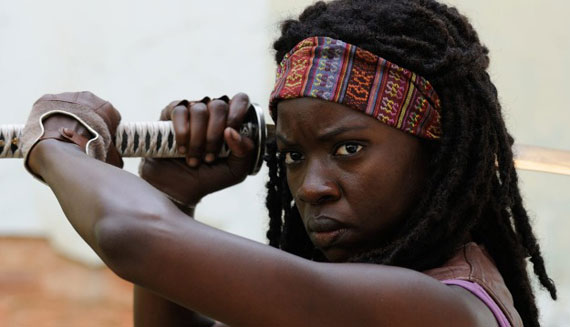
Not since the late award winning author Yvonne Vera, has a Zimbabwean artist had such a far-reaching effect on the global stage.
Admire Kudita Own Correspondent
Having graced the covers and pages of major league US magazines such as Vanity Fair, Essence, New York Post, Vogue, normally reserved for big time actors such Nicole Kidman, Danai Gurira, actress and award winning playwright is a daughter of the soil and bona fide star.
She has hobnobbed with Hollywood glitterati such as Denzel Washington, Spike Lee and a galaxy of others. In the country during the festive holidays to showcase her award winning play The Convert, Danai is the lead actress in the cult US television series called The Walking Dead.
The television show has spun off merchandising of figurines made in her character Michonne’s likeness! Gurira, the daughter of Zimbabwean expats in the US: a chemistry professor Roger Gurira and his wife Josephine, a fellow university graduate. Danai is young, gifted and black.
She is a young woman very much in touch with her artistry and vigilant to the call of her destiny as a storyteller, whether she is acting or writing plays. The world is standing in awe with trailers of her show garnering twelve million hits on You Tube.
Why did it take us so long to celebrate her? I (SE) sat down with Gurira (DG) several days ago to get her story which has many facets. This is the first of a two-part interview:
- Chamisa under fire over US$120K donation
- Mavhunga puts DeMbare into Chibuku quarterfinals
- Pension funds bet on Cabora Bassa oilfields
- Councils defy govt fire tender directive
Keep Reading
SE: You have done all these great things, what is the most important work you have done as an artist so far? What is the most serious project you have done professionally to date?
DG: I feel like the most important work I have done is help artists of African descent to be able to shine through my plays. The thing about this play (The Convert) is that I asked who would I have been if I had been born in the 1890s with all these forces (Christianity, colonialism and culture) converging, what my path would have been. I just wondered why these stories were not being told. I feel the most fulfilled when I see Zimbabwean actors shine through this work that I have written. I have had very joyous experiences actually with American actors trying to learn the local lingo and embodying these characters. That sort of cultural ambassadorship is very important to me, when our voices have been heard, to see that other people have absorbed our voices, our culture in America. There is a lot of emotional explanation that has to be invested in that actors have to make with this play and to learn in terms of understanding the nuances of the language. In America, actors in this play have been rewarded with awards. It’s very gratifying for me as a writer.
SE: What comes first your being a performer or your being a creator?
DG: It’s all the same. With me it’s about story telling whether as a writer or an actor.So at the core there is a storyteller. When I am embodying another character’s experience I am telling a story.
SE: At the core of you is a story teller?
DG: Yes, at the core is a story teller.
SE: When was the epiphany about your work?
DG: I was at university in the US studying psychology for my bachelors. But I decided to take a semester of study abroad and I chose South Africa because this country was just next door to me all those years growing up in the eighties and I couldn’t even go there. When I went to South Africa then I realised that I could use art to help people release their voices because of the legacies of people like John Kani whom I met on a later visit. Plays like Woza Albert (by Mbongemi Ngema) made me realise that sort of cultural ambassadorship was possible. I learnt something about myself. It was new (independence in South Africa). People still had some scars, they still remembered and it was recent. I decided then that I wanted to tell stories. I also met this Zimbabwean photographer Mthethwa who was going about in the shanties and townships photographing people in the way that they wanted to be photographed giving them dignity. When I went back I decided to flip it and then did the MFA (Masters in Fine Arts) for my post-graduate studies.
SE: You had not considered studying drama?
DG: I started with psychology because it was all about being an academic like my father and live a comfortable life. Psychology is about studying the dynamics of the human mind. It’s actually aided my work, to know how trauma works and that helps in developing character. How am I going to be able to help other people’s voices to be heard, the injustices to be heard through art ? Giving voice to those issues.
SE: We all most people in my generation grew up with some sort of American dream. How did you find yourself there ?
DG: My parents went abroad through churches. My mother went through the United Method Church and also my father Roger Gurira went through the Quaker church. They were at Goromonzi together though, and they met up together again in the US. I was five when my dad decided to move back in 1983. My father was at the UZ and my mom was librarian. He is one of the unsung ,heroes who came back home. I have gained a lot more respect for my father now when I think about it that he was one of those who made sacrifices and came back home for the reconstruction of Zimbabwe after the war of independence. He was very loved by his students. He loved to teach, he loved to nourish the minds of students. His students would come back later bringing him things like Olivine oil and Mazoe like that. He was one of those people who didn’t have to come back because he was a tenured professor at Grinnell University in Iowa, US, which means you couldn’t be fired, but he chose to come back.
SE: You seem to have a strong desire to teach. What are you doing about it?
DG: I started Almasi with Patience Tawengwa (incidentally the daughter of late Harare mayor Solomon Tawengwa). When Patience and I created Almasi we were thinking about how we could teach, how we could pass skills. We need to keep the presence of theatre in our society. Look at the humanisation that it brings. Look at the sort of leverage the Brits have with Shakespeare. The theatre reflects the human heart back to us. Even the Holy Scriptures use stories to bring messages to the fore. The story and the experience of human beings go through is powerful. If I didn’t think that there was a lot of talent in Zimbabwe why would I invest my time and money?
SE: How many artists are in this Almasi project and how much are you paying them?
DG: 30 actors but it’s indelicate to talk about money(she says laughing).
SE: Is it an either or proposition for an artist as regards getting formal education? Is being an artist and going to school mutually exclusive?
DG: Training is very important. That’s what Almasi Collaborative Arts (diamond in Swahili. . . the idea of something that stays forever) It was Patience’s name. It’s all about the dream to have something like The Market Theatre in South Africa churning out high professional Zimbabwean art that can be exported to bring our own stories to the fore. It’s about how do you grow as an artist? I have had a lot of training as an artist. So training for an artist is an absolute necessity through Almasi. When I teach, I find that it’s thrilling when the artists make a shift and make a leap. I have been trained and I know how to pass it on.
SE: What is the importance of theatre or the arts in general ?
DG: Look at how much leverage the British have gained with Shakespeare (at a psychic level). Look at Anton Chekhov, at Bernard Shaw. It’s part of the humanisation process. The theatre is healing. Story is powerful. There is such cultural ambassadorship in storytelling. It does enhance our psyche as a nation. The Europeans believe that they produce brilliance, they believe in their own greatness. They are getting leverage off of something that was created a long time, 450 years ago they have a very high sense of self because of that. We need to invest in the arts and our artists need to push themselves in excellence.
SE: What ingredients make for such a society ?
DG: It means you invest.
SE: What do you mean “ invest”?
DG: Invest means you come to watch a play. Investment means that you commission a playwright.
SE: What are you saying to a corporate head, what are you selling them in return for the investment?
DG: Sometimes they (corporate heads) don’t have that exposure. But once you have exposure to great art you will not be the same. Over there in the US they have boards that have been there for 30 years running the arts. Those are non-profits. They have people who love the arts and make donations which are tax deductable. So it’s important to have these non- profits taking an active role in the arts. I like the idea of a place where is a lot of employment for young people where there is stratification of roles. Someone is responsible for development, someone for the budget and so on. The artist can then concentrate on his art without worrying about the other stuff.
SE: What kind of folk run these joints and do they go to school for it?
DG: The head of Macarthur is a Princeton graduate! These are highly educated people. Most of these people are degreed most often. But I believe there are many paths to getting an education and training in the arts.
SE: How did you get to Hollywood?
DG: When you are talking about Hollywood what are you talking about? It was never my goal to get to Hollywood. It was a matter of being true to my calling. But my agent got me there. They do work on a commission basis. But my now manager saw me first in the Continuum, a play that I wrote.
SE: Is this agent a guy who gets up every morning to look for his showbiz clients?
DG: And the work too.
SE: What training does he have?
DG: He started as an agent. He went to a good college Oberlin. But the thing about America is that you have to start at the bottom. You have to pay your dues. Everyone has to have the humility and pay their dues with a humble heart. Show yourself as someone who is dedicated to the craft. Just telling people that you are good doesn’t cut it.
(Next week the story continues as Danai talks about Chiwoniso Maraire and other issues close to her heart such as her role in the Walking Dead as Michonne)
Feedback to [email protected]














